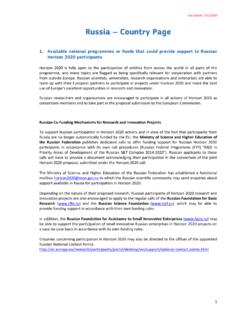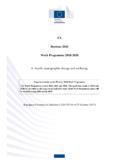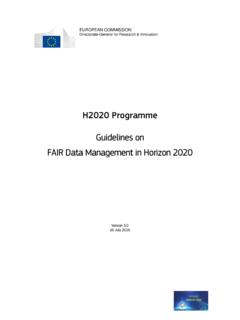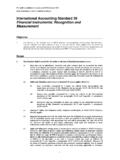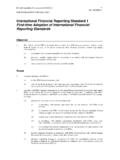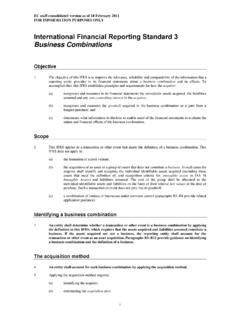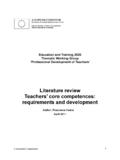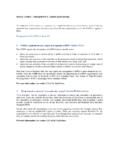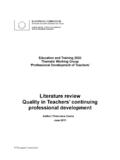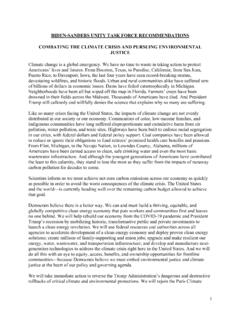Transcription of Air Pollution and Climate Change - European Commission
1 Contents PageReducing black carbon emissions benefits both Climate and health 4 Research concludes that reducing black carbon emissions would prevent millions of premature deaths as well as helping meet Climate Change mitigation Climate policies need a Pollution safety margin ? 5 Climate Change policies may need to make greater GHG reductions in order to accommodate the warming of reduced air Pollution , say Climate Change could affect European ozone Pollution 6 Average ozone concentrations will increase more in Southern Europe than in more Northern regions under the influence of Climate Change in the 21st century.
2 According to impacts on air Pollution could increase respiratory disease 7 Rapid reductions in emissions from fossil fuel burning are needed to curb increases in ozone and protect public health, say Climate Change and air Pollution strategies: a winning combination 8 According to research, combining policies that tackle local air Pollution and global Climate Change will deliver enhanced benefits for Climate Change the complex chemistry of the atmosphere 9 There have been significant advances in the understanding of atmospheric processes in the last decade.
3 But a recent study suggests that uncertainties continue to articles 10A selection of recent articles from the Science for Environment Policy News Alert research projects 11A selection of research projects funded under the EU s 7th Framework Programme for policies for better tackling of Climate Change and air pollutionContinued reductions in air Pollution and greenhouse gas (GHG) emissions are essential, as they pose serious threats to both people s health and the environment across the world.
4 Air quality and Climate policies can provide mutual benefits: Climate Change mitigation actions can help reduce air Pollution , and clean air measures can help reduce GHG emissions leading to reductions in global warming. There can also be trade-offs, if reducing a particular pollutant emission leads to additional atmospheric warming rather than , air Pollution and Climate Change influence each other through complex interactions in the atmosphere. Increasing levels of GHGs alter the energy balance between the atmosphere and the Earth s surface which, in turn, can lead to temperature changes that Change the chemical composition of the atmosphere.
5 Direct emissions of air pollutants (eg black carbon), or those formed from emissions such as sulfate and ozone, can also influence this energy balance. Thus, Climate Change and air Pollution management have consequences for each that emissions are linked to air quality and Climate Change , this thematic issue presents recent research that investigates the trade-offs and co-benefits that may be gained from reducing both long-lived GHGs, responsible for Climate Change , and air pollutants, responsible for adverse impacts on human health, ecosystems and the Climate .
6 Issue 24 November 2010 Air Pollution and Climate Change (Continued on page 2)Air Pollution and Climate Change2 European Commission DG ENVI ssue 24 November 2010 Although reducing particulate matter (PM) has clear health benefits, understanding the impact of this reduction on Climate Change is essential if mutual benefits for Climate and health are to be delivered. The overall impacts of reductions are complex because PM is made up of many different chemical components with different physical properties, some of which lead to warming of temperatures (eg black carbon) by absorbing heat from the sun, whilst others (eg sulfates) bring about cooling effects by reflecting sunlight.
7 Several studies suggest that, in addition to health benefits, reducing black carbon sources would lead to cooling of global temperatures (see: Reducing black carbon emissions benefits both Climate and health ). On the other hand, other studies point out that reducing air Pollution could worsen Climate Change in the short-term by contributing to an increase in global temperatures (see: Do Climate policies need a Pollution safety margin ? ). This is still an area of active research with many uncertainties to air quality is also caused by emissions of nitrogen oxides, methane and other volatile organic compounds that combine in the lower atmosphere to produce ozone.
8 Ground-level ozone is a serious pollutant, which at high levels, damages human health and vegetation, including crop yields. In addition, ozone is a short-lived GHG contributing to Climate Change . Changing environmental conditions, including rising temperatures caused by Climate Change , are expected to increase concentrations of ground-level ozone. Policies and management strategies to reduce ozone levels must be designed in light of evidence that there is a Climate penalty since increased temperatures make it more difficult to reach targets for ozone (and PM) in summertime.
9 In particular, policies must incorporate evidence of how Climate Change is likely to affect different regions of Europe, if they are to be effective. The article, How Climate Change could affect European ozone Pollution , reports on research which suggests that Climate Change will lead to higher ozone levels across southern Europe this health costs of ozone Pollution are likely to worsen under Climate Change . The impacts of Climate Change on air quality, ozone levels and ill-health are presented in Climate impacts on air Pollution could increase respiratory disease.
10 (Continued on page 3)Air Pollution and Climate ChangeEuropean Commission DG ENV 3 Issue 24 November 2010A reduction in pollutant emissions that produce ozone would not only improve public health but would also provide Climate benefits. Integrating Climate Change and air quality policies would be the most effective article, Integrated Climate Change and air Pollution strategies: a winning combination , compares the costs and benefits of implementing reductions in local air Pollution and Climate Change actions separately or in combination.
